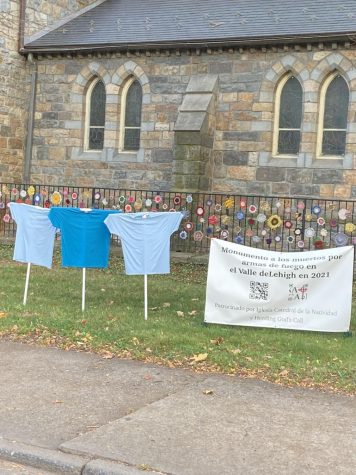‘Are They Stealing Our Jobs?’ and More FAQ About Immigrants
Out of 318.9 million people, the United States is home to approximately 10.9 million illegal immigrants and 45.3 million legal immigrants. While President-elect Donald Trump’s stance on illegal immigration has fluctuated substantially, one of his previously proposed plans received endless support: mass deportation, or kicking 11 million people out of our country. What is the truth about illegal immigrants? How much of what we think we know is actually false?
Are illegal immigrants taking legal citizens’ jobs?
A 2015 report by the Pew Research Center found that undocumented immigrants work mostly in lower-skilled, lower-paying jobs, “much more so than U.S.-born workers.” It also found that higher percentages of undocumented immigrants hold jobs with the “least desirable conditions,” such as animal slaughter.
“When I hear ‘undocumented workers,’ I immediately think of under-the-table workers and migrant farmers,” junior Rabia Khan said. “Unfortunately, these are often the occupations that undocumented workers are subject to in order to support their family while escaping their situation from across the border. These people are not taking our jobs, they are picking up the leftover jobs that nobody else wants.”
Giovanni Peri, an economist at the University of California, Davis, through research comparing the labor markets in states with high immigration levels to those with low ones, concluded that undocumented workers complement, rather than compete with, skilled laborers. From 1990 to 2007, undocumented workers increased legal workers’ pay in skilled jobs by up to 10 percent.
This means that if illegal immigrants who work on construction sites take care of routine tasks on a daily basis, complementary skilled laborers like electricians and plumbers have the ability to focus on what they do best, thus participating in larger numbers and increasing overall productivity.
“I think mass deportation would cause a shock to the workforce and the economy, because currently many illegal immigrants are here working illegally for wages lower than what legal citizens are willing to work for,” Spanish teacher Mrs. Jennifer Jaen said.
However, undocumented workers have lowered the wages of U.S. adults without a high school education by anywhere between 0.4 to 7.4 percent. Skilled native-born workers are forced to choose between either accepting a lower wage or simply working in a different field altogether.
“One problem I see is that [illegal immigrants] take jobs. Yes, I know there are jobs that some people won’t do, but you are here illegally and are living off of [legal citizens’] work,” senior Caleb Bauder said. “That does not sit well with me. However, I feel that if you are an illegal immigrant, and you get a job and start to make something of yourself, and you don’t cause legal trouble, you should be allowed to stay.”
Are illegal immigrants draining our social services?
By paying taxes and Social Security, immigrants contribute far more than they use in social services. According to the chief actuary for the Social Security Administration, Stephen Goss, undocumented workers contribute around $15 billion to Social Security through payroll taxes each year, and take out only $1 billion; over the years, they have contributed nearly ten percent of the $2.7 trillion Social Security Trust Fund. Furthermore, most undocumented immigrants are not even eligible for most welfare programs (TANF, SSI, Medicaid, SCHIP, etc.) because they must have been permanent legal residents in the U.S. for at least five years.
Are illegal immigrants dangerous criminals?
According to the Public Policy Institute of California, native-born adult men are incarcerated at a rate over 2.5 times greater than that of foreign-born men. A 2014 study by Northwestern University found that “there’s essentially no correlation between immigrants and violent crime.” Because undocumented immigrants make up more than 25 percent of the overall immigrant population, it is virtually impossible for the overall immigrant crime rate to be so low if crimes committed by undocumented immigrants were significantly more frequent. According to the 2010 Census, 1.6 percent of male immigrants are in jail, compared with 3.3 percent of native-born males. Researchers often question the accuracy of Census data for prisoners because it is possible that immigrants could lie out of fear of being deported; however, similar trends can be found going back to 1980.
What action has the United States taken in response to illegal immigration?
According to the Department of Human Services, between the years 2009 and 2015, the Obama administration removed more than 2.5 million people through immigration orders. President Barack Obama urged the U.S. Immigration and Customs Enforcement (ICE) to focus on criminals, not law-abiding families who hold jobs in the U.S. In 2015, 81 percent of illegal immigrants deported from the U.S. were “first priority” criminals, or those who were considered “threats to national security, border security, and public safety.” First priority criminals include gang members, convicted felons or those charged with “aggravated felony,” and anyone trying to illegally enter the country at the border. The Obama administration also deported “priority two” criminals, or those convicted of three or more misdemeanor offenses (not including minor traffic violations), as well as those convicted of domestic violence, sexual abuse, burglary, DUIs, or drug trafficking.
“Our current immigration policy is too relaxed. We are too easy on illegal aliens. In my opinion, if you can prove you are working, and are staying out of trouble, you should be allowed to stay,” Bauder said. “However, those that come over and expect welfare and handouts should be sent back immediately. There are too many illegals here already that cause trouble and should be sent back. We should be stricter on immigration policy.”
As of now, president-elect Donald Trump has shifted from a firm stance on mass deportation, to deporting only criminals prior to making a decision about law-abiding families.
“I feel that anyone who wants to come should have an opportunity to do so, but they need proper channels that allow them to obtain legal residency or citizenship. People leave their countries for many reasons, I think we need to be mindful that others live in very dangerous situations and need to seek asylum,” Mrs. Jaen said, “and we need to be understanding of that and provide them with the opportunity to live in this country legally. Unfortunately, this is where our system is broken and not functioning properly.”
While opinions on illegal immigration may deviate considerably depending on one’s political affiliation, it is important to remain informed on the issues and, with the upcoming inauguration of President-elect Donald Trump, the emergence of new policies.

Senior Sarah Trebicka is a four-year staff reporter and former two-year Our World editor, now serving as editor-in-chief for the Spotlight. In addition...












